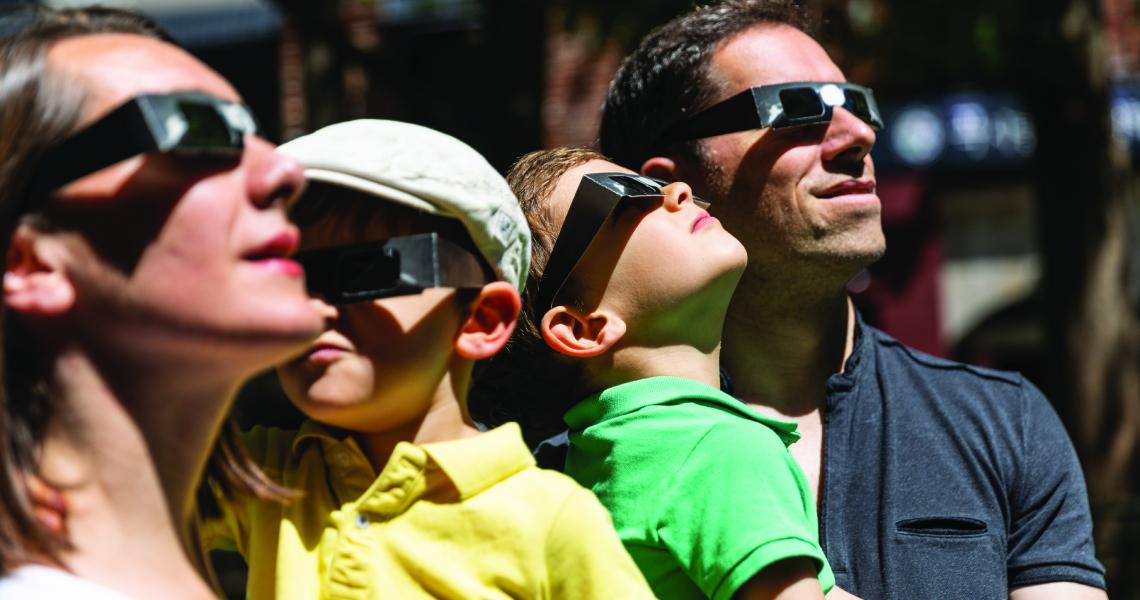On April 8, for the first time since 1932 and the last time until 2106, a total solar eclipse will cross North America, passing over Vermont and the North Country in the afternoon. Starting at about 3:25 pm, the moon will pass between the sun and the Earth, completely blocking the face of the sun. Our region will go dark in the middle of the day for over three minutes, and many of us will look up.
Staring at the sun, or looking at the partially eclipsed sun, even briefly without wearing suitable eye protection can permanently damage your retina. "The retina is a really special part of the eye,” says Jessica McNally, MD, an ophthalmologist who practices at both University of Vermont Health Network – Central Vermont Medical Center and University of Vermont Medical Center. “It's like a layer of wallpaper. It layers along the back part of the eye, and it's got some very specialized parts that receive the light," she says.
Looking at the sun during an eclipse is harmful because you're looking at light that you normally wouldn't be looking at, says Dr. McNally. That light can damage your retina and cause blindness, or what's known as solar retinopathy. That's why protecting your eyes during a solar eclipse is crucial, she says.
Why Your Eyes are at Risk During an Eclipse
High-energy light from the sun, called ultraviolet light, is still present during an eclipse. The difference during an eclipse, Dr. McNally explains, is that we don't have the protective mechanisms that we usually do to keep our eyes from being damaged by ultraviolet light.
"Generally, when we are looking around at normal things in our environment, and the sun is coming into our eyes, we have our normal reaction, which is to blink or close our eyes," she says. "Our pupils will also decrease in size, allowing less light to enter the eye." That doesn’t happen during an eclipse since the visible light – the bright light that usually makes us turn away – is significantly decreased or blocked.
Use Vetted Special-Purpose Solar Filters
The only safe way to look directly at the sun—during an eclipse or not—is through special-purpose solar filters or official eclipse glasses. Traditional sunglasses, even those with very dark lenses, won’t protect your eyes. It used to be that looking for the logo of the International Organization for Standardization (ISO) on eclipse glasses and filters was enough to know you were getting the right protection. But the American Astronomical Society (AAS) says that’s no longer the case. The AAS has a vetted list of companies whose products are known to conform to current ISO standards, specifically ISO 12312 2.
If you have glasses from a previous eclipse, make sure to check them out before the day you need them. "If you have old eclipse glasses, you want to make sure that they're not scratched or damaged before you use them again," Dr. McNally says. Scratches or pinholes can allow harmful sunlight through and damage your eyes.
Also, be very careful if trying to photograph the eclipse. Viewing any part of the sun through a camera lens, binoculars, or a telescope without a special-purpose solar filter secured over the front of the optics will instantly cause severe eye injury. The AAS website also includes a vetted list of companies selling solar filters for telescopes, binoculars, and camera lenses to use.
Information about making homemade solar filter devices for eye protection is available online, but Dr. McNally urges caution.
"People should be very careful when they're making homemade devices,” she says. “When you have damage to the retina or solar retinopathy from an eclipse, the damage can be permanent.” Her advice? Don’t put yourself at risk.





